Chuck Wendig's Blog, page 35
October 25, 2021
The Worldbuilding In Villeneuve’s Dune
 The inevitable Dune post has arrived.
The inevitable Dune post has arrived.
I mean, c’mon, you knew it was coming.
We will just get out of the way right now my review: I loved it. I did not expect to love it. I adore Villeneuve’s work pretty universally, not a bad note in that fella’s song so far, but I have a lot of squirrelly feelings about Dune. They’re not particularly complicated or controversial, these thoughts, they’re just a loose tangle of snarls and burrs that make me generally disinterested in it. To try to name the three legs of this stool: first, I read the book in high school and found it to be fine, and, like a lot of weighty sci-fi, firmly up its own ass; second, I really love the David Lynch version for maybe no good reason except I love Lynch and it’s such a weird and brave adaptation for its time (even if Lynch’s vision was itself compromised); third, as a writer of genre fiction and reader of it and as a friend to many genre writers, I’m always like, hey there are other books, you can make other books, you don’t need to keep hacking away at this one, JFC.
Any doubts I had were dashed against the rocks. I watched the film at home, which rankles some cinema purists*, but I have a pretty TV with surround sound that makes my living room better than most theatrical experiences (barring, say, IMAX), with the bonus that I can pause the movie to get up to go pee (sorry, I mean, “refill my stillsuit”). And I was held rapt by it. I watched it a second time last night, this time with my 10-year-old, and to my surprise, he seemed to like it, too (with the exception of him reaching the end and being like, “wait what where’s the next part” and I said, “I think in about two, three years” whereupon he made a face like he’d just eaten a cat turd).
It’s rare I want to rewatch a movie so quickly, if at all. This felt like a seven-course meal and a strange dream in equal parts, and I wanted to keep going back to it, to experience new tastes and to try to decipher little bits, savoring this bite, pondering over another. It’s not a happy movie. It’s a tragedy. And the film wisely doesn’t divert away from the fact that the prophecy of this desert Messiah is one that is propped up, invented, seeded by the Inscrutable Witch-Nuns. I also really enjoyed that for what is traditionally to me a very cold, speculative story, Villeneuve and the actors went the extra distance to make me feel the humanity of some of these characters. Not overmuch, not so that it feels ham-fisted, but there is I think a habit of getting so lost in the weeds of the political maneuvering and prophetic machinations that you can very easily lose the people in that equation. (Though I also could’ve used a little more here. I enjoy that the Emperor’s jealousy is kept far from us, like a shadow threatening to overtake the light — but I really wanted more character from the Baron, whose hatred of Duke Leto feels so intensely personal but has no expressed reason to be. His character in the film ends up being mostly just Wow What A Bad Guy, which isn’t quite enough.)
As usual, I also like to pick apart a thing, at least a little bit, to try to understand what went into the architecture and articulation of a particular story. If not necessary to provide a “lesson,” then to consider how other creators choose to organize and design narrative. Choices are made in the telling of a tale, and I like to try to understand those choices. Both as a “firmly up my own ass” thought exercise and also to see if there’s anything to help me sharpen how I tell my own stories. Right? Right.
Here, I think the big takeaway for me — though surely there are more to come — is in how the film hands its worldbuilding. Dune as a storyworld has a lot of it — the story of this first book is one that sits atop a rather prodigious history of its own galaxy, and one with a lot of fiddly, crunchy bits on which the story seemingly relies. It’s actually so crunchy and obtuse I’m not even sure I entirely understood it —
Up until now. Until this movie.
Which is a helluva thing, really.
I really, really love its approach to worldbuilding, which seems to match with what my own desires for worldbuilding happen to be. In capsule, I’d describe the approach as this:
When the worldbuilding is inessential to the movement of the story, it discards it.
When the worldbuilding is essential to it, it folds it into the experiences of the characters.
It does not promote worldbuilding as the story’s priority. It demotes it to being only support.
(Which, in my mind, is what worldbuilding is there to do, lest your story become an RPG manual.)
Most importantly, Villeneuve trusts the audience.
To unpack this a little more —
There can be a habit in some movies or books to tell some of the background worldbuilding in a display of grand exposition — a voiceover, an encyclopedic chapter, a speech by a character Haughtily Explaining Things In A History Lesson. The story becomes a temporarily mouthpiece for Exposition Delivery. Now, the writing advice of Show Don’t Tell is well-meaning but not universally applicable, because sometimes it’s far more direct and empathetic to the audience to just tell them a thing rather than go through the shadow puppet play in order to demonstrate it. Just the same, it can also be true that Capital-T Telling can become very boring, very quickly. Nobody wants a story to be a lecture, even if that lecture is just trying to teach a class about its own history, culture, science, food, religion, what-have-you. This is especially true in film, where you need to be particularly judicious with your time. A minute of movie can be $100k or more in cost.
In Dune, Villeneuve is glad mostly to expect that the characters of this world know what’s happening, and to just move through it, and past it. (Contrast this with the godawful worldbuilding exposition found in a movie I otherwise quite like, The Force Awakens. The C3P0 “As you know, Bob, er, I mean, BB8” scene is so jarringly bad, as are any scenes where Leia explains to Han things that Han obviously definitely knows already.)
I’m spoiling a bit here (though it’s also difficult to spoil a story that has been around for over 50 years in a variety of iterations), so close your eyes now if you don’t want any spoilers at all —
But in the early scene where Duke Leto receives the Imperial Decree or whatever-the-fuck-it-is, we don’t need a lot of data. Simply by pushing forward into that scene without waiting for you to catch up, we swiftly learn there’s an Emperor, he spent a lot of money to send his envoy here, Leto’s signet ring is important in asserting his authority, and this is a moment of great significance for the Atreides family (one they hope is ascendant but that is ultimately tragic). We get a very brief glimpse of a Bene Gesserit witch but we really don’t know who all the Daft Punk motherfuckers are who are hanging out there, and it doesn’t really matter. I mean, it matters if you view story as a collection of details and data, but if you care about the broad human strokes of it, it really doesn’t add up to anything useful except trivia. (That said, there are those readers and genre fans for whom it is the trivia that matters most, and these tend to be the readers and watchers that care most about the notion of “canon.”) Villeneuve trusts you, the audience, to gather the context clues and to move on.
When context clues aren’t enough, the worldbuilding is delivered in merciless, in-narrative experiences. When it’s time to know what a Stillsuit is, the narrative is allowed do double-duty in the story — it’s about the suit being fitted to the Duke and to Paul, and in that we get a host of vital narrative bits: we meet Liet Kynes; we see how fiercely protective Gurney is over Leto; we see that Paul is able to intuit things about Fremen life and culture, and also that Kynes recognizes it and is aware of the prophecy. It’s a lot of juiciness while simultaneously telling us what a Stillsuit is. Later, we learn of a “sand compactor,” and Villeneuve doesn’t stop to explain it — he’s just like, “Fuck you, it is what is says it is, and you’ll see it later, it’s fine.” Then he just… ushers you past it.
It’s a good approach, because it doesn’t bog you down in details, and it makes sure that the focus of the story is on what matters most in the story: the characters. They’re why we’re here — we’re not here for the internecine grappling of empires and fiefdoms. We’re here for the people inside that internecine struggle, because without them, the story just becomes another bad high school history lesson where they fail to focus on why individuals matter and instead demand you simply know the dates of their kingly or presidential reigns, as if that’s all that really matters.
It’s wonderful. I like it.
Not to mention, it’s a beautiful movie. Truly.
I may have more thoughts on it at some point, but for now —
I HAVE COMMITTED BLOGGERY.
*presses big fat chonky ring into blob of wax*
*signet ring image is a screaming possum*
HOUSE WENDIG IS TRIUMPHANT.
Now buy my books (Book of Accidents, Dust & Grim) or I die in the desert of obscurity.
BYE
* okay to unpack “cinema purists” a little, there has, particularly with Dune, been this attitude that somehow seeing a movie in a movie theater is How You Must See Filmses, which of course utterly disregards the fact that the life-span of a movie is at best 5-10% of its total experience, and the rest of it will be on televisions and tablet screens and, I dunno, eventually on the control panel of your SmartFridge or some shit. It’s also ableist and pretentious and is a weird attitude to shove in people’s faces during a fucking global pandemic, AH YES THE ONLY WAY TO SEE A MOVIE IS TO GO OUT AMONG THE UNWASHED LUNG-HORKING MASSES AND ENJOY THEIR RESPIRATORY MIASMA, WHICH WILL BE THRUMMED INTO YOUR BRONCHIAL TUBES, FOR NO MASK IS A DEFENSE AGAINST THE MIGHT OF DOLBY ATMOS. Plus in this day and age people have 4k tablets and 8k TVs and room-filling surround sound or killer headphones. Shit, some of my favorite movies I watched on crappy CRT televisions in the 80s and 90s. It’s fine. If you like watching movies in theaters, do so! Huzzah and hooray. Just don’t judge me for not wanting to go to one of our local shitbox theaters where someone will bring a screaming baby and another person will be texting the whole time in front of me and a third jerk will be dully kneeing my chair every 47 seconds.
October 22, 2021
Various Warblings And Ululations
Once again, I arrive with clumsy flourish, to bring you whatever thoughts I can squeeze from my soggy braincake. (I saw Soggy Braincake on the side stage at Lollapalooza, 1994.) Increasingly I am of a mind that treating this blog occasionally like a newsletter is not the worst idea, as those who subscribe get this neat little bundle hand-delivered by digital elves upon me clicking Publish. So, let’s get to it, shall we?
Go Watch Only Murders In The Building Now, Right Now, Hurry Up
Did you like Ted Lasso? Did you want to feel that way again? Then I have the show for you. Steve Martin, Martin Short, and Selena Gomez fucking kill it in this murder-mystery — it’s got more NYC sensibilities than Ted Laddo’s melange of Midwest and UK vibes, but it’s ultimately still not overly cynical. It’s funny, it’s murdery, it’s occasionally sweet. I won’t spoil it but the finale had me laughing so hard we had to pause the show so we didn’t miss anything. It’s really fucking great, and it deserves your eyeballs. And awards. And a puppy. Sidenote: Selena Gomez should be on deck to play Miriam Black in a Blackbirds adaptation for television. Dear universe, please make this happen, thank you. *stares very hard at the universe*
On The Other Hand, Succession?
I continue to bounce very hard off this show. It’s not the show’s fault. The show is brilliant. It’s a me problem, not a them problem. I’ve tried watching it a few times now, and I’ve never made it through the first season. I find the characters not merely reprehensible, but each of them bleeds this miasma of second-hand-embarrassment that makes me almost literally recoil. Again, to the credit of the show, I recognize this is intentional — and the actors are very clearly nailing it. They’re exceptional. But I can’t crack it. It’s also possible I’m watching it at the wrong time — not the wrong time in the world (though that’s part of it, too, in that I don’t necessarily want to watch a bunch of Murdochian fuckheads traipse about being epic douchebags), but I mean, literally, the wrong time of day. As we have a kidlet running around, I tend to watch more (ahem ahem) mature programming at night before bed, and before bed is not when I want to feel tense from watching Murdochian fuckheads. Part of me thinks, what if I watch it during the day? Maybe. Hmm.
It’s interesting to me, because a show like Billions works for me, and yet those characters are reprehensible, too. Sopranos, Breaking Bad, all of them contain largely reprehensible and irredeemable characters, but they’re… even when not necessarily redeemable, still human. The characters of Succession are satirical, in part, and that means they’re more openly cartoonish, buffoonish, and sinister. Their humanity is harder to find. I think there’s a trick to making unlikable characters, and as I’ve long said, it’s to worry less about likability and more about livability. Like, can you live with these characters as narrative roommates, even if they’re fuckheads? You can get away with more of this when the story is in a shorter format, right? Like, a movie makes it easier, because it’s 90-120 minutes in, then you’re out. But a TV show demands you stew in it, and sometimes it feels like hanging out in a septic tank instead of a spa tub.
But, again, I note: brilliant show, and I think I just need to approach it differently.
That, or it’s not just a show for me, which is also totally a thing!
Children Ask Amazing Questions
So, in case I haven’t crammed it into your eyeholes enough, hey, I wrote a middle grade book! Molly Grim inherits a funeral home for monsters and has to share the inheritance with a brother, Dustin, she’s never met. Dust & Grim! Please go buy it or get it from a library lest I wither like a dying spider, legs curling inward as I gently turn over onto my back! Or something.
Anyway!
So, this week I’ve done my first ever school visits (well, not really first ever as I’d visited my son’s school in the past), but at the very least, the first in support of a single book, and the first done over Zoom. And it’s weird, of course, because basically you get up there and talk at a screen for 20, 30 minutes, and I just sort of blather and stammer about my book and hope that I’m not totally boring the children to absolute tears. But! But. Then we get to the Q&A portion, and that is my favorite. Because kids ask amazing questions.
They don’t come up and say HELLO THIS IS MORE OF A COMMENT THAN A QUESTION, they don’t ask convoluted fan questions or crawl-up-your-own-ass-with-pretension questions.
They just ask really cool questions.
Sometimes they’re really simple, like
HI MY NAME IS JORDAN WHAT IS YOUR FAVORITE MONSTER
And it’s like, uhh yeah, hell yeah, that’s a fun question, I want to answer that question. No sarcasm. That’s a delight. Other times, they ask really weird questions like
HOW MUCH DO YOU THINK ALL YOUR INTERNAL ORGANS WEIGH
And it’s like, okay, that’s a fun one, too, let’s game that out, let’s do the math.
Then! Then I had one group who was very clearly doing a unit on writing, because they asked some seriously hard-hitting questions about writing. This is no joke, these are not made-up questions:
HOW DO YOU BUILD SUSPENSE IN A BOOK
HOW DO YOU MAKE ANTAGONISTS LIKABLE
HOW DO YOU KNOW WHEN TO END A CHAPTER
HOW DO YOU USE THE RIGHT AMOUNT OF FORESHADOWING
WHERE AND HOW SHOULD YOU START A STORY
Like, uhh, haha, oh shit those are real questions. Can’t I just talk about my favorite monster again? Those are real-deal writing queries, and the kids were really thoughtful, and it was wonderful.
Kids are cool.
Anyway.
Our Dog, The Bug That Is Snoo
Hey, our dog is doing okay, for those who have asked (and thanks!). She had multiple courses of anti-b’s, and has to have her BUTT GHOSTS exorcised once a month at present, but so far, that’s holding the Wolves of Surgery at bay.
Advancing The Advance Conversation
I don’t know what started it, but on Twitter there has been quite a bit of fol-de-rol over the question: is $100,000 is a big advance or not? I take it some author said it wasn’t, or it wasn’t as big as you’d think, or what-have-you.
So, let me clear up my thoughts on this:
It’s a big advance.
It’s also not automagically life-changing.
It can be.
But it isn’t necessarily.
The thing is, as with nearly all discussions, there is a whole lot of nuance that has to get packed into it, and generally speaking, Twitter is a place where nuance goes to die. Nuance are bumps and splinters, and every conversation on that cursed bird-site sands those bumps and splinters down. Everything gotta be this or that over there. But the bumps and splinters are texture…
And texture is a necessity.
Consider:
Some advances are as low as $10,000.
So, a $100k advance is higher by 10x, which makes it pretty sizable.
And if you’re already working a full-time job, that money — on top of your other money — probably makes a big damn difference, and can change your life. Maybe not lottery money life-changing, but, hey, it’s a huge pressure off.
And yet, there are… considerations.
First, you’re going to give 15% of that to an agent. So now it’s a $85k advance.
Second, you’re going to give some portion of that to taxes. Assume, bare minimum, you’re going to give 25% of that to taxes, so you’re going to be left with ~$60k out of that initial $100k advance.
Third, that advance will not be paid to you all at one time. It will be divvied up in 3-5 payments. First, on signing. Then at various other mile-markers along the way: when you turn in a draft and it is accepted by the publisher, when it is published, when trade paperback comes out a year later, when there’s a Super Blue Blood Wolf Harvest Moon, when the Moon Hits Your Eye Like A Big Pizza Pie, when you finally kill your first man in Reno — whatever. There are gates, and you gotta walk through those gates to trigger a payment.
So, if in 1/3rds, you’re going to get roughly $20k each time.
And that can be paid out over the course of 1-2 years, depending on how long the process takes. Publishing a book is not fast. Drafting a book to reaching bookshelves is a journey.
Fourth, is it for one book, this deal? If so, well done, good job. If it’s $100k for, say, a three book deal, that hits real different. Because now it’s more books, more time, and less money per book.
Fifth, where do you live? Is it San Francisco? Then congrats, that advance just paid for your annual coffee budget. Is it Ohio? Congrats, you can put a payment down on a reasonable home! Where you live really matters as how far that dollar goes. That’s not to say living in San Francisco isn’t amazing — certainly you’re in the midst of a lot of culture in a city, culture you might not so easily access in, say, Centralia, Pennsylvania. (Aka, THE EVER-BURNING TOWN.) But access to that kind of culture is not cheap. Sadly. Cruelly. We continue to silo parts of our country and culture to the Already Wealthy. (Which writers generally are not, to remind.)
And a final consideration is that publishers, now trying to portion out the payments over more stages and longer periods, are also enjoying an industry that is on the rise — book sales are up, not down, during the pandemic. (Though no telling what supply chain issues will do to that.) And, my personal opinion is that they’re also spending less money to send authors out on tour or go to conventions, so, it does in fact feel like a bit of a sting to try to stretch those payments out even further, thus diminishing the very idea of what an “advance” is supposed to be. (The core idea of an advance is, or was, “Here is money you can live on while you edit this book and ideally, write the next one.”)
Anyway. All this is a very long-winded way to say, again:
Yes, $100k is a big advance. It is important to note that.
It’s also important to note it’s not as big as you think — or, rather, it doesn’t go as far as you think. And overselling a $100k advance as being this WHOA WOW LIFE-CHANGING EXPERIENCE runs the risk of empowering publishers in continuing to pretend that they’re doing you a favor. (As a reminder, publishers are not your friend. The people inside them are wonderful, and as an industry I am of a mind that it’s a whole lot healthier than many, many others. Even still, be careful about assuming that any scraps you receive are a gift to you, rather than what is owed — or less than what you should be owed.)
Moving on.
Where’s Wald–Uhh, I Mean, Where’s Wendig
I was super gonzo cuckoopants lucky to get to talk to the wonderful Felicia Day, who invited me onto her podcast, Felicitations, to talk about APPLES. Not the computer. Nay. The fruit. The gorgeous, weird, wonderful fruit. Heirloom apples and Johnny Appleseed and apple detectives and we also talked about books and I think cryptocurrency? I dunno. It got weird. Anyway! I had a ton of fun on this and thanks to Felicia for having me on. Go check it out.
What else?
Dust & Grim got a shout-out from Bloody Disgusting (!!) as one of ten horror books perfect for the Halloween reading season, saying: “Wendig offers a whimsical spooky tale full of ghosts, vampires, fairies, cryptids, and monsters of all types for the young and young at heart. Wendig crafts a middle school read that treats his target audience with respect. In other words, it may be a lighthearted horror fairy tale, but the author isn’t afraid to inflict pain or heighten the stakes.”
The Book of Accidents got listed by Kirkus as one of their 13 scariest books of 2021!
I did a Q&A with Publishers Weekly if you wanna read that interview. I mostly talk about writing Dust & Grim! But also a little about writing during a pandemic, too.
Tonight, I get to hang with one of my best homies, Delilah S. Dawson, where we’re *haughty tone* TWO AUTHORS IN CONVERSATION, talking about writing and middle grade and scary stuff and spoopy stuff and who knows what else. That’s at 7pm EST tonight, please come and check it out.
Finally, Dust & Grim got its third (!) starred review, this one from the BCCB, saying: “Wendig thrills, enchants, and amuses in equal measure with this uniquely bizarre fantasy adventure.” That full review will be published in their November issue.
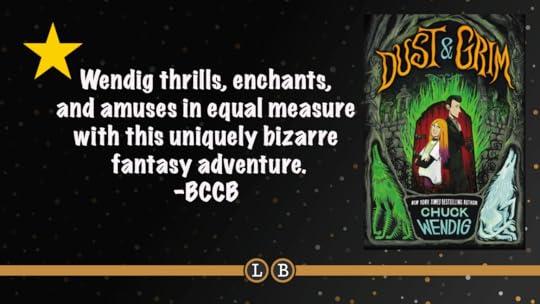
What I Have Been Filling My Brain With Lately
Playing: Been rounding the bend on my Mass Effect playthrough, halfway through ME3, now. It’s such a fantastic series. There’s supposed to be an ME4, yeah?
Reading: Kiersten White’s Hide and Gabino Iglesias’ The Devil Takes You Home. The former is a sharp-toothed amusement-park thrill-ride where a game of reality show hide and seek goes, uhhh, let’s just go with “horribly awry.” And the latter is a gut-stabbing horrory noir about crime and consequence born of out of the struggle of poverty, and the tangled nightmare of grief. Both great reads. Now onto Alex Segura’s so-far-excellent Secret Identity. Crime novel set in the world of 1970s comic book industry.
Watching: Only Murders, obviously. Gonna try to watch Dune this weekend. Watching John Stewart’s new show, which was good, if a little pokey — not that I need or desire my news-explorations shows to be funny, but Last Week Tonight and Daily Show still do it better, I think. Stewart’s show still feels like it’s finding its feet, and honestly, I haven’t been too enamored that lately he went in on the “lab leak” notion for COVID-19 origins (which so far is an unsubstantiated theory), and also that he was supporting Chapelle with his anti-trans sentiment in The Closer — while I recognize that comedy is comedy, I also think these guys really want to have their cake and to eat it, too. They want comedy to be this truth-telling medium where the jokes are actually in some way revelatory, saying what we all think. But then when they’re called on it, the jokes suddenly become “just jokes, not serious, how dare you get mad at jokes, jokes are equal-opportunity offenders,” as if comedy requires a victim to be funny. Then they go in on cancel culture, claiming they’re victims of it from their streaming TV shows that backed the money truck up to their houses. I don’t mean to suggest the comedians are vile or monstrous people, but I really think they both want the power of comedy to be this epic, transcendent thing — until they receive the mildest of criticisms, at which point, they turtle up and say, OH WAIT THESE ARE JUST DUMB JOKES, YOU DICKHEADS, HOW DARE YOU TRY TO QUASH MY FREEDOM OF EXPRESSION, ANYWAY, SEE YOU LATER ON MY TV SHOW. I’m not even picking on Stewart overmuch here, or really, even just Chapelle — it’s a deeper trend of very sensitive comedians, usually men, who can’t seem to take criticism. Jokes matter, until they don’t, etc. No one can just say, “I’m sorry I hurt your feelings.” Meanwhile, they’ll never choose to identify with right-wing Trumpy-types, even though their core message remains ultimately the same: “Fuck your feelings, I can say what I want.”
Wow, that was a longer rant than I intended. Hm.
Regardless, given the Netflix walkout, organized by Trans*, you should join me and consider a donation to an organization like The Trevor Project or the Audre Lorde Project.
ANYWAY, NOW HERE ARE SOME PHOTOS.
Some photos!
Okay, first photo up (and you can see all my photos at Flickr) is maybe one of my most favoritest photos of all time. Every year I try to capture shots of golden-crowned kinglets, and these little fuckers are hard to capture. They move like a blinking cursor. They often stay on the interior of evergreens. Usually my shots of them are just blurry bird-ass. But this year, they’ve been more personable, and there have been a lot of them. So, I got this shot:

Like HOLY CRAP look at the iridescence through the wing! Really lucky with that shot.
More below:
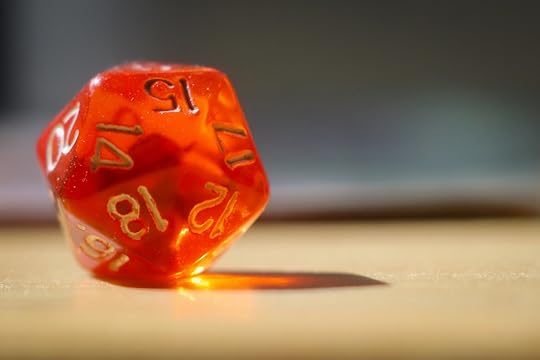




October 18, 2021
Dust & Grim Is Here!
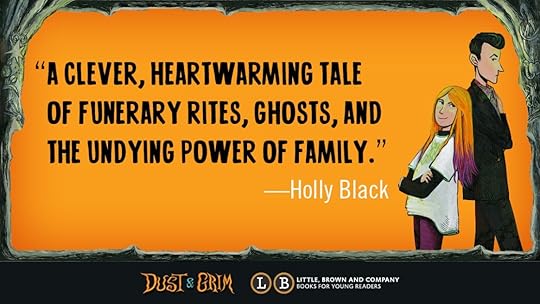 “Monstrously fun…. A sure pick for those enamored by Neil Gaiman’s The Graveyard Book (2008), and Tahereh Mafi’s Whichwood (2017).”—Booklist (starred review)
“Monstrously fun…. A sure pick for those enamored by Neil Gaiman’s The Graveyard Book (2008), and Tahereh Mafi’s Whichwood (2017).”—Booklist (starred review)
AHEM AHEM AHEM
*clears throat*
IT IS TIME, my friends, to seize your Dusty Grims, your Grim Dust, your *checks notes* Dust & Grim. That’s right! My MG debut is officially out in the world tomorrow (though I hear tell many folks are finding them in bookstores already, which is wonderful).
It’s a fun, spooky, spoopy book about a girl who inherits a funeral home for monsters and must share that inheritance with a brother she’s never met. It contains vampires and foxes and wolves and magic and one (1) Florg, plus many more creepy, kooky things. It is ostensibly for kids aged 8-12, but I’ve had adults read it and enjoy it (my take is that if you like Christopher Moore books, you’ll like Dust & Grim). It contains beautiful art by Jensine Eckwall. Art directed by Karina Granda. Edited by Deirdre Jones. I had a blast writing it. I hope you have a blast reading it.
I’m going to reiterate some information here, so bear with me —
I am doing events this week and next, and there are some additions here:
Monday, 10/18, 6PM EST, Virtual launch event at Books of Wonder with Matt Wallace, tickets here. Pre-order Matt’s wonderful Supervillain’s Guide to Being a Fat Kid.
Tuesday, 10/19 6:30PM EST, presently virtual event at Let’s Play Books, Emmaus, PA, event details here.
Wednesday, 10/20, 7PM EST, Virtual event at Anderson’s bookshop with Greg Van Eekhout. Details here. And checkout Greg’s newest, Weird Kid, which my own kid adored.
Thursday, 10/21, 7PM EST, Ludington Library event! Details here.
Friday, 10/22, 7PM EST, Virtual event at Porter Square Books with Delilah S. Dawson. Details here. Grab Delilah’s spooky good time, Mine.
Tuesday, 10/26, 7PM EST, Scrawl Books Book Club Event, details here.
Wednesday, 10/27, 7PM EST, One More Page Books, a Halloween Vs Christmas Holiday Showdown Throwdown with me and author Tiffany Schmidt (author of next week’s release, I’m Dreaming of a Wyatt Christmas). Details here.
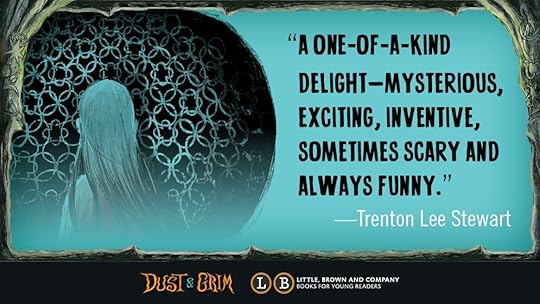 And there are a number of places to buy the book, as well —
And there are a number of places to buy the book, as well —
Signed/personalized copies from Doylestown Bookshop, Let’s Play Books.
Or from the other bookstores above:
Books of Wonder, Scrawl Books, Porter Square, Anderson Bookshop, One More Page
You can also find a local indie through Indiebound, or buy through Bookshop.org.
B&N, too, is a good choice for print copies — and you can find other buy links here!
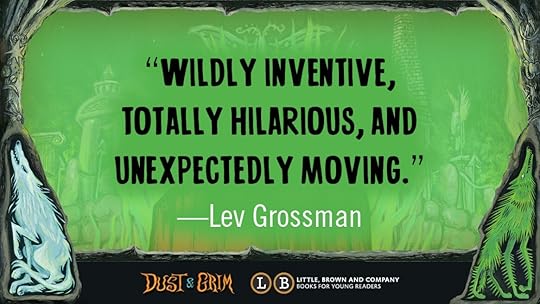 If you want to read some nice things said about the book:
If you want to read some nice things said about the book:
“A clever, heartwarming tale of funerary rites, ghosts, and the undying power of family.”—Holly Black, Newbery Honor-winning author of Doll Bones and The Cruel Prince
“Wildly inventive, totally hilarious, and unexpectedly moving.”—Lev Grossman, bestselling author of The Silver Arrow and The Magicians
“A one-of-a-kind delight—mysterious, exciting, inventive, sometimes scary and always funny, Dust & Grim reads like a rollicking ghosts and monsters story, which it is. But just as important, it’s a compelling and tender story about family. Sibling duo Molly and Dustin will find their way into readers’ hearts as surely as they find their way into each other’s.”—Trenton Lee Stewart, bestselling author of The Mysterious Benedict Society
“Sucks you in with a wise-cracking zaniness that soon spirals into a delightful rampaging chaos of swarming vampires, thorny wolves, walking trees, and eldritch horrors. And yet even as the dangers for Molly and Dustin increase and the wise-cracks keep flying, the importance of family both lost and found grounds their story with a profound sense of heart.”—Paolo Bacigalupi, bestselling author of The Windup Girl, Ship Breaker, and Zombie Baseball Beatdown
“Spookily charming, bewitchingly creepy, full of hope, heart, and horror, Dust & Grim is the sort of book you gobble up in one sweet and salty bite.”—Delilah S. Dawson, author of Star Wars: PHASMA and Mine
“Every line of Dust & Grim is packed with a laugh, a sharp observation, or something radically cool, and sometimes all three at once. I thoroughly enjoyed it. Wendig is a welcome new voice in middle-grade fiction, and we are lucky to have him.”—Greg van Eekhout, author of Weird Kid, COG, and Voyage of the Dogs
“Siblings Molly and Dustin Grim are the most unlikely of heroes, and for that reason they are among the greatest. The fact that they must save the world from within a secret monster mortuary is only the first of many surprises that bestselling tale-spinner Chuck Wendig has created for this full-of-heart debut about trust, friendship, and the importance of having the perfect costume for every occasion. A fantastic, spooky adventure!”—Fran Wilde, Nebula Award winning author of Updraft and Riverland
“Playing to strengths demonstrated in his many comics and tales for older audiences, not only is Wendig a dab hand at concocting extremely creepy critters, but here he also pulls together a secondary cast of quarrelsome but supportive allies for the beleaguered teens.”—Kirkus Reviews (starred review)
“Wendig offers a whimsical spooky tale full of ghosts, vampires, fairies, cryptids, and monsters of all types for the young and young at heart. Wendig crafts a middle school read that treats his target audience with respect. In other words, it may be a lighthearted horror fairy tale, but the author isn’t afraid to inflict pain or heighten the stakes.”—Bloody Disgusting
“Packed with pop-culture references and creepy beings, the novel is written from Molly’s sarcastic-beyond-her-years viewpoint and subtly threaded with life lessons that together create an engaging narrative.”—Publishers Weekly
October 7, 2021
Caitlin Starling: Five Things I Learned Writing The Death of Jane Lawrence
Practical, unassuming Jane Shoringfield has done the calculations, and decided that the most secure path forward is this: a husband, in a marriage of convenience, who will allow her to remain independent and occupied with meaningful work. Her first choice, the dashing but reclusive doctor Augustine Lawrence, agrees to her proposal with only one condition: that she must never visit Lindridge Hall, his crumbling family manor outside of town.
Yet on their wedding night, an accident strands her at his door in a pitch-black rainstorm, and she finds him changed. Gone is the bold, courageous surgeon, and in his place is a terrified, paranoid man—one who cannot tell reality from nightmare, and fears Jane is an apparition, come to haunt him. By morning, Augustine is himself again, but Jane knows something is deeply wrong at Lindridge Hall, and with the man she has so hastily bound her safety to.
Set in a dark-mirror version of post-war England, Caitlin Starling crafts a new kind of gothic horror from the bones of the beloved canon. This Crimson Peak-inspired story assembles, then upends, every expectation set in place by Shirley Jackson and Rebecca, and will leave readers shaken, desperate to begin again as soon as they are finished.
Abdominal surgery Calls To Me, and I don’t know whyThe Death of Jane Lawrence makes book number two in which there is an early plot-central colostomy. (The first, of course, is Gyre’s suit hookup in The Luminous Dead.) It wasn’t always that way; in the first version of the book, it was a very standard, run-of-the-mill horrifying leg amputation, a Victorian surgical specialty that has the benefit of not risking serious death in a time period that is only just discovering antiseptic technique.
But then revisions happened, and I needed to make the injury that caused the surgery weird, and, well, now you’ve got a klein bottle for a large intestine and you need a colostomy if you’re going to live.
(And then I added five more abdominal surgeries to the book, and I only realized the extent of the infestation when I was writing up content warnings.)
Look. I don’t know why I’m so obsessed with rerouting bowels and excising eldritch lumps. Something about the centrality of it, maybe? How inherently violating it is? Maybe how, after, you have to deal with a fundamental change to how you live?
It did grant me the absolutely amazing experience of consulting with an ER doctor in the family about possible complications and medical limitations of the setting, in which said doctor coined the phrase “location of the magical insult”.
What I forgive in a character is not necessarily what readers forgive in a character.In the very first draft of The Death of Jane Lawrence, Jane was, perhaps, a little too forgiving to her new husband. Secrets? Well, it’s reasonable not to dump your trauma onto your new wife! Gaslighting? He was only trying to insulate her from his problems! Delusional and uncalled for attempted surgery? He was just scared!
You can imagine how this made my critique partners tear their hair out. My goal had been to make Jane’s husband sympathetic, but in belaboring his motivations, the book became me making excuses and crying, Oh, he’s not that bad! (He was. He still is. This is a gothic we’re talking about.) It turned out that the way to actually make him sympathetic (or at least engaging) was to drop his POV, stop justifying – and to let Jane react with a little less acceptance and a lot more frustration.
This is why readers are so important at every stage of the process: what you take away from your own writing is not what other people will take away from it, and it can sometimes be hard to anticipate where the differences are.
(Note: Sometimes the mismatch is not actually a problem. There is a point near the end of the book, in which Jane does something which I found not only reasonable, but rather romantic.
My editor had to remind me that it was, in fact, horrifying. And since this is a horror novel, that’s a good thing.)
Cocaine is a hell of a drug.A quick disclaimer: I’m pretty sure that if I am the last person who should ever take cocaine, for the sake of myself and everybody who has to deal with me.
But cocaine was a standard part of the Victorian pharmacopeia, and what better tool is there when you need to be functional after long nights without sleep thanks to your haunted mansion or, moreover, when you absolutely need to stay awake for several days straight for a touch of ritual magic?
It was entirely reasonable to give my characters cocaine. But cocaine, plus the close third person perspective the book is written in, plus the already constantly escalating and spiraling weirdness of the plot turned into something perfectly, wonderfully terrible. Suddenly, Jane, who is by any measure confident and a little outside the norms of general behavior, was taking even bigger risks.
The trick, of course, is to make each decision feel natural; being able to immediately dismiss it as, “Oh, our lead is now on drugs,” cheapens the impact. That’s where the perspective comes in: Jane’s concept of what she’s doing is entirely medical and practical, and the moment of dosing herself does not immediately precede her questionable cocaine decisions. There’s a delay, long enough and subtle enough that Jane, and therefore the narrative, can’t connect the dots. An attentive reader can, of course, but the mismatch between reader knowledge and narrative produces that necessary horror ingredient: dread.
Go weirder.The Death of Jane Lawrence, for all its classic trappings, is a completely bonkers little book. (Did the cocaine tip you off? What if I tell you that Jane’s understanding of magic is based in calculus?) It didn’t start that way, though. In earlier drafts, I kept things simple and easy to explain, my few flourishes constrained to what exactly are ghosts in this world? and okay, what’s another gnarly medical thing I can add here?
That made for a nice book. But I just stopped worrying so much, it could be so much better.
Two things got in the way of that, at first. One: marketability. Money is good. Money is a necessary component of why I write. And writing something weird makes it less likely to sell, right? Turns out, that’s not exactly true. If The Luminous Dead’s relative success taught me anything, it’s that, if you can get the weird on the shelves, it sticks with people. If you just let your weird brain weasels out to play, and show them off at the best angles, people like that. They pay you money. They want more!
Which brings me to the second roadblock: I have spent my whole life trying not to be so weird. My brain occasionally goes way too hard in directions that the people I meet in my day to day life don’t get (or, worse, are disgusted by). That made trying to tap into that weird a very scary, vulnerable process. It wasn’t even that I looked at what I knew I wanted to do and went, “No, that’s scary, can’t do that.” I had buried some of this down so deep that I had forgotten what I wanted. It took a lot of excavating to find it again.
Absolutely worth it, but a bitch of an exercise.
Revisions make the heart grow fonder.There have been a lot of iterations of this book. There have been at least two ground-up rewrites, maybe three, and a whole lot of tweaking at each step. It was one of the most frustrating experiences of my creative life: here was a book that I loved, beyond all reason, and it wasn’t right, and wasn’t right, and still wasn’t right. The things I loved about it just weren’t translating to my early readers, and I spent years tearing it apart and putting it back together, trying to find what was going wrong.
Over time, I made everything weirder, and made Jane take bigger risks, and just got loud about the parts that I enjoyed most. I let them take up more page count. I wallowed around in them, because, let’s face it – if I never fixed the book, I at least wanted to enjoy some of that failure. And if I wasn’t having fun, then what was the point of beating my head into a wall?
There were dark times, of course, but by the time we got to the final draft, I was still having fun. I was having more fun, actually. I wanted to yell about the book even louder, to more people, for longer. The story that started The Death of Jane Lawrence was good! But where we’ve ended up?
Well, that’s magical.
***
Caitlin Starling is an award-winning writer of horror-tinged speculative fiction. Her novel The Luminous Dead won the LOHF Best Debut award, and was nominated for both a Locus and a Bram Stoker award. Her other works include Yellow Jessamine and a novella in Vampire: The Masquerade: Walk Among Us. Her nonfiction has appeared in Nightmare and Uncanny. Caitlin also works in narrative design, and has been paid to invent body parts. Find her work at www.caitlinstarling.com and follow her at @see_starling on Twitter.
Caitlin Starling: Website | Twitter
The Death of Jane Lawrence: Indiebound | Powells | Bookshop.org | B&N | Amazon
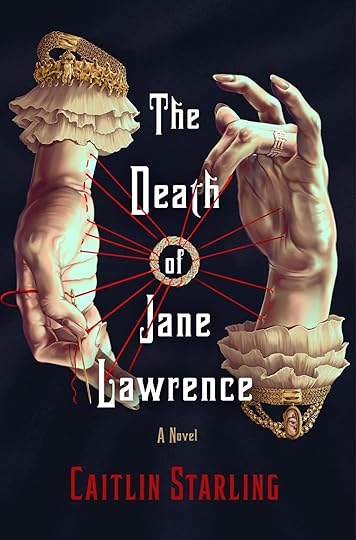
October 5, 2021
Gwenda Bond: Five Things I Learned Writing Not Your Average Hot Guy
A paranormal romantic comedy at the (possible) end of the world.
All Callie wanted was a quiet weekend with her best friend. She promised her mom she could handle running her family’s escape room business while her mom is out of town. Instead a Satanic cult shows up, claiming that the prop spell book in one of the rooms is the real deal, and they need it to summon the right hand of the devil. Naturally they take Callie and her friend, Mag, along with them. But when the summoning reveals a handsome demon in a leather jacket named Luke who offers to help Callie stop the cult from destroying the world, her night goes from weird to completely strange.
As the group tries to stay one step ahead of the cult, Callie finds herself drawn to the annoying (and annoyingly handsome) Luke. But what Callie doesn’t know is that Luke is none other than Luke Morningstar, Prince of Hell and son of the Devil himself. Callie never had time for love, and with the apocalypse coming closer, is there room for romance when all hell’s about to break loose?
From New York Times bestselling author Gwenda Bond, Not Your Average Hot Guy is a hilarious romantic comedy about two people falling in love, while the fate of the world rests on their shoulders.
Sometimes you have to get away from your desk.Not Your Average Hot Guy has what I think is an interesting origin story. Winters are not my favorite. All those gray days just drag me down, and every year it seems worse (yes, I have the SAD light!). So I was already looking forward to just getting out of the house and driving down to Tennessee for a book festival by March–in this case the Southeastern Young Adult Book Festival (SE-YA for short), organized by the Four Librarians of the Apocalypse (this should’ve been my first hint). I wanted to do stuff with my friends! Fun things! So I switched into activities director mode, which I’m occasionally wont to do.
For instance, one night we went to play ski-ball at Chuck E. Cheese. I noticed there was an escape room business in the strip mall bordering the hotel we were all at. Over drinks that night, I found a group willing to give it a try and booked us a reservation. Which booked wrong! I panicked and called in the morning. They were supposed to be closing early for a wedding, but the lovely people at the business agreed they could make it work during the late afternoon for us. Whew, without that escape room trip, this book probably would never have existed.
We did a Baker Street/Sherlock Holmes-themed room with great effects. It was the perfect mix of people and we escaped within the allotted time. There was even a wonderful dog hanging out behind the desk.
On the drive back home, my brain spun out almost this entire book. I love writing about family businesses, and I wondered what it would be like if your family ran an escape room. And what if you accidentally put a real grimoire in a room? And also, what if it summoned a devil, and what if instead of the usual it was the devil’s son and that’s a whole different kind of family business…. AND what if it was a rom-com? When I got home, I sat back down at my desk and tweeted this, and then wrote what would stay the first few pages. Beginnings are usually impossibly hard for me. Sometimes you need to have a little adventure.
When you’re truly excited about an idea, ignore the reasons you shouldn’t write it.On paper, in 2017, absolutely no one would’ve suggested I write this book. A rom-com with paranormal elements? Paranormal was dead, they said (which is never true, by the way; all genres are undead and everything in publishing cycles). Certainly, on paper, paranormal romance would be a hard sell. Also? A book with all these good vs. evil elements? A rom-com set during a (possible) apocalypse? I kept it to myself for awhile, but it fell out of my brain onto the page. I was having so much fun writing it, even while it was a difficult challenge for reasons I’ll discuss later in the list. I wasn’t initially sure if it was YA or for adults (it’s for adults, but has been deemed crossover, as the characters are early 20s).
When I showed a portion to my agent, I expected her to love it too, and she did! But she had a lot of questions. And advised that I needed to write the whole thing, not just a proposal. She was most certainly correct, but later admitted that she usually hates these kind of god/devil sorts of books. But she ended up loving this one when it was done, which is why she made that admission (whew). Still, I had to keep putting it aside to write other things, but then I’d come back to it. I was not at all confident anyone would like this book, let alone want to buy it.
But I decided not to care. And I kept coming back to the page. There’s a lot of me in this book, especially my sense of humor. I’ve never been the sort of writer who makes decisions based on anything other than the story that feels like I want to tell it and which is the most me. Even when I’m writing IP (intellectual property), like Stranger Things or Lois Lane, it has to be a good fit that I can put my voice into and feel like I’m bringing something with me.
Responses to this book on submission were almost universally positive, but a lot of people didn’t know what to do with it. I was convinced all along I’d have to make it less weird. I’m so happy it found first Tiffany Shelton, and then Jennie Conway, at St. Martin’s, who have supported this book like whoa, along with everyone else who worked on it there (you know who you are, but I’m going to shout you out anyway, because you don’t get enough recognition–Kerri Resnick for the cover direction and design, Mary Moates and Natalie Figueroa from publicity, Erica Martirano and Kejana Ayala on the marketing side). And during a pandemic.
I could’ve easily talked myself or let myself be talked out of writing this book–there’s a risk as you get further in a writing career to believe you somehow understand publishing and think maybe if you just did this, you’d get where you want to go. But publishing will always be unpredictable. That is the only predictable thing. Sure, be strategic, but your voice and what interests you, the weird way you combine all the art that made you, the you part of your books, all that is the only thing no one else can bring to the table. You have to trust it.
Comedy is hard.You’ve probably heard the phrase, “Dying is easy. Comedy is hard.” It’s so good, it’s no wonder it’s an iconic quote, despite the fact its origin and wording are difficult to source. I think one of the reasons besides other work the first draft of this took so long to complete is because it is a comedic novel. Yes, it’s right there in the rom-com part, and I wanted to make sure the book was funny… But comedy is hard. It’s delicate and intricate and must feel organic and it’s also extremely personal. I’ll explain.
I honestly don’t think I’d have been brave enough to write straight-up comedy until this point in my writing journey. In person, I like to think I’m funny (oh god, no one who thinks that is funny, but let’s set that aside–let’s say, I like to laugh, and I like to make other people laugh, and I think life is generally absurd and, even when it’s actually horrible, I tend to deal with it with humor, which is something my family always did too). In fact, one of my early mentors in grad school when I decided to start writing novels said, “This character pushes people away with humor right before things get real.” And I was like, “THIS ATTACK ON ME IS UNWARRANTED. But possibly accurate.” The thing is, though, humor is actually incredibly revealing and personal.
To put what you think is funny on the page is a different kind of vulnerability. Because senses of humor are very particular and personal. While, in general, people not liking your books sucks, but doesn’t equal a rejection of you, people rejecting your sense of humor…well, it kind of does feel that way. So, even more than on a craft level, which is incredibly tricky, it’s also nerve-wracking to write funny. As much or more so than entering a new, much-beloved genre…
You will end up writing the thing you don’t think you’ll ever write or have an interesting take on.Almost anyone who knows me well will tell you I’ve long been obsessed with comedy and particularly the classic screwball rom-coms of the 1930s and ‘40s, but also modern rom-com. Much as I used to be obsessed with circus novels and the circus itself, but never thought I’d write a circus book, because what new did I have to add? Then I started Girl on a Wire, and then it became a whole circus series. So, yes, I’ve written romantic novels with humor in them–certainly the Lois Lane books fit–but I never really thought I’d get to write rom-coms. Particularly not with a kind of classic screwball sensibility mashed up with all the mythological and/or supernatural/occult stuff I love and romance.
And then, of course, just like with Girl on a Wire, I got hit by that lightning idea and it was happening.
Truth is, most of us have genres or things we’re low-key or major-key obsessed with, and often it’s those that will mug you. They’re deep in your subconscious. I love so many things about romantic comedy. Banter. Lightning wit. Two people who challenge and make each other better versions of themselves. Sheer absurd situations, and moments that will change the characters’ lives, and laughter. Some of my favorite comedic writing ever can be found in Preston Sturges’ scripts. When Christopher, my husband and sometime writing partner, and I first met and started dating, he got me a shooting script for The Palm Beach Story for my birthday (along with a fancy copy of the play Medea–I CONTAIN MULTITUDES). I’m obsessed with the books of Connie Willis, particularly the comedies. And with so many rom-coms I can’t begin to list them.
But I never thought I’d write an honest-to-god rom-com…. Because writer brain reasons. And yet, now that I have and still am, I have so many ideas for more. I love this genre deeply, and all the things it lets us explore. I love how science fiction and fantasy (and romance itself) allows us to replicate the constraints in fiction that made all the classic rom-coms with their class dynamics and other-reasons-not-to-be-together classic rom-coms. I used to argue with people about how SFF could be uniquely positioned to do this in a certain way, and, duh, now I’m writing them and hopefully the books make the argument better than I ever could
Romance is a genre for joy.We have this persistent myth in our culture that things that are tragic or depressing or even just serious or cynical or whatever are somehow wiser and more important and more difficult to pull off. That they are more intrinsically valuable, and have more to say about life. Same problem often shows up with shows or stories that explore the complications of good people–Ted Lasso and Superman haters, I’m looking at you.
I read all over the map, and reading romance specifically has been a master class for me as a writer on emotional vulnerability and arcs. I snuck plenty of romance as a teen, but I started reading romance in a real way about ten years ago, though I’d already been reading urban fantasy with heavy romantic threads before that, and it quickly became a part of my reading diet. During the pandemic, it’s what kept me going. I wanted to laugh. I wanted the safe space of a book that ends with the closure of a happy for now or happy ever after. Those borders can allow you to take any emotional journey that exists. Romance is as varied as any other genre, in terms of mood and types of stories, and quality of writing. But there is always that sense that the author cares about you and your experience while reading. There is the sense that the book is a gift for you, the reader.
That’s very much how I approached writing this book. It’s the apocalypse, but it’s a fun apocalypse. I think we’ve all had enough of the other kind in reality at the moment (not that I don’t love a good fraught post-apocalyptic–like my host’s Wanderers, for instance).
But romance is–like YA–still much-maligned and looked down on because of its perceived status as being primarily for and about women, and, by extension, somehow disposable and frivolous. Imagine that. There are still people who act like romance and romance writers and readers have cooties. Guess what? COOTIES ARE FAKE. And romance readers and writers are smart as fuck.
Which is what makes it such a joy to write for them, for you. I hope you all dig this book, and its sequel, out next spring! I hope that they bring you joy. Many thanks to Chuck for letting me blather about all this here.
***
Gwenda Bond is the New York Times bestselling author of many novels, including the first official Stranger Things novel, Suspicious Minds. She also clearly escaped from a classic screwball romantic comedy. Not Your Average Hot Guy (out now!) and The Date from Hell (April 2022!) are her first rom-coms for adults. She lives in a hundred-year-old house in Lexington, Kentucky, with her husband, author Christopher Rowe, and a veritable zoo of adorable doggos and queenly cats. Visit her online at www.gwendabond.com or @gwenda on Twitter.
Gwenda Bond: Website | Twitter
Not Your Average Hot Guy: Bookshop | Indiebound | B&N | Amazon
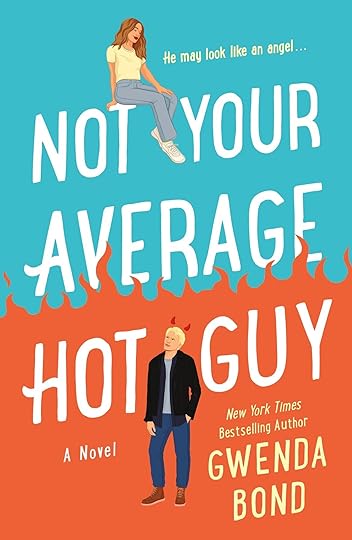
October 4, 2021
What’s The Word From Wendigworld?
 WENDIGWORLD makes me think of some kind of horrible amusement park. Robotic Wendigs wander the park, entertaining you, until you decide they are fodder for your violent desires, and then the Chuckdroids revolt and — well, ha ha, I’m sure none of that is real, please ignore the Wendig Automaton on the workbench behind me. *hastily covers it with a tarp* *the tarp twitches*
WENDIGWORLD makes me think of some kind of horrible amusement park. Robotic Wendigs wander the park, entertaining you, until you decide they are fodder for your violent desires, and then the Chuckdroids revolt and — well, ha ha, I’m sure none of that is real, please ignore the Wendig Automaton on the workbench behind me. *hastily covers it with a tarp* *the tarp twitches*
Whatever. Once again, a missive, an epistle, a newsletter-shaped thing. Let’s go.
Our Dog’s Butt Has Been Exorcised, Maybe
So, when last we visited the topic of Snoobug’s butt (aka, the Snoobutt?), it was haunted by butt ghosts, and though in that post she was improving, she then took a turn for the worst. She stopped eating, and ping-ponged between Restless Velcro Dog and Dog Who Sits In One Place Staring Off Into Space. So we investigated having the butt ghosts exorcised via butt ghost surgery, but getting a consult on the surgery would take weeks — because, as it turns out, there’s a veterinarian crisis in this country in addition to all the other current crises. (Someone on Twitter, and I forget who, I apologize, said vets basically pay medical school prices for training, and make teacher salaries for the actual job. Which, yeah, is not sustainable. The vet hospital we called said it was also in part due to the surge in shelter pets, though some articles suggest the data doesn’t necessarily hold up there, so who the hell knows. Either way, welcome to the work crisis unfolding across jobs and age ranges.)
We were not particularly excited about the prospect of surgery
a) because it’s surgery
b) because recovery from butt surgery involves a lot of, well, theoretical ass mess and
c) umm, it was going to cost around $5-6k when all was said and done.
And we’d already paid like, over a grand just in vet visits and meds. And though we would gladly pay the price to save the life of our butt-ghost-possessed Frankencorgi Shepherd, we were not exactly excited about the prospect of finding that kind of money.
One more trip to the regular vet got us a load of new meds, meds to help her eat and such — and then, somehow, mysteriously, she began to turn the corner. She started acting normal again, and not possessed by the Haunch Demons that inhabited her Haunted Caboose. So, we canceled the consult, though I note here our vet suggested still getting the surgery. We said maybe to hold off, and we’ll just have her looked at (and her Ghost Glands exorcised) monthly to see. The vet seemed amenable.
So, we saved ourselves many thousands of dollars, huzzah.
And then the next day, our HVAC broke.
Fuck.
Eat Shit, Heating And Cooling
I know, what an exciting update this is so far! Butt ghosts and heating-air-conditioning. Fucking scintillating material, I know. Is it any wonder I am a wordsmith by trade?
Yeah, the blower motor fucking died and then, of course, because there is a Crisis Around Every Corner, our HVAC company was like, “We can fix that, but we don’t have the part, and we don’t know when we can get the part, because” and you know what’s coming next, don’t you, “SUPPLY CHAIN ISSUES.” *crash of thunder*
They did call us and tell us they should have it sometime this week, and it has admittedly been the best possible time of the year not to have HVAC — it’s been a nice 60-70 degrees outside and inside. Just the same, it’s going to cost us, because of course it is. Did I mention you can help me out by buying my books? That would be nice. Buy books, help a dog, exorcise some butt ghosts, heat a house. Er, you’re not heating the house with butt ghosts. Though I suppose that is one sustainable way forward in this era of a changing climate. But are butt ghosts made of methane? Hmm. Probably. This needs more thought, by which I mean, let’s not think about this any more at all.
Speaking Of Supply Chains And Books
Hey, did you know I have a book out soon? You did, of course, because I won’t shut up about it, but juuuuuust in case you’ve been trapped under a WOODEN BEAM or have been LOST IN A COAL MINE, my debut middle-grade novel, Dust & Grim, is out October 19th. Amazon has picked it as one of their Best Books of October, and as always, local brick-and-mortar bookstores across the country will have the book for you (Indiebound | B&N | Bookshop). Even more fun, if you were so inclined to get a signed and personalized copy (oooooh), then I will soon be signing those for both Doylestown Bookshop and Let’s Play Books, so order there and let ’em know you want me to devalue your book with my erratic marker scrawl!
(Please note, too, my event with Let’s Play Books is now all-virtual — I would love to do an in-person event, but with a kiddo unvaccinated and your kids unvaccinated it just doesn’t seem like quite the right time to do an in-person event. Ideally, once my recent books start to come out in paperback next year, I’ll be back to doing in-person events again.)
Dust & Grim should give you spoopy fun, and if you’re looking for something with less spoop and more straight-up spookiness, there’s also The Book of Accidents. Embrace the horror. Get creepy. (I can also do signed, personalized copies of that through Doylestown Bookshop.)
It’s good to order your books now, because the supply chain is being a tricky little gremlin right now, and to guarantee you get the print copy you covet, it is best to order early to ensure that you get what your sinister heart craves.
And if you have checked out the books and enjoyed them, I will waggle my eyebrows at you and try to make intricate facial gestures at you to indicate that you should definitely leave a review online at the review receptacle of your choosing. (Amazon, Goodreads, Storygraph, etc.) If you read the books and did not like them, you are free to write your review on a slip of paper and gently slide it into the mouth of a nearby badger. The badger will take it to the labyrinth below the earth, where the Badger Underking rules. He will store your negative review in The Great Root-Tangle, a vital archive.
Speaking Of Supply Chains, Part Two
Boy, it’s getting weird, isn’t it? It’s unpredictable what exactly you won’t be able to buy. It’s not just like, “Well, toilet paper is tough to find,” it’s everything from HVAC blower motors to fig bars. Some whole shelves at grocery stores are just… empty, and again, empty in a weird way. “We don’t have pickles this week,” a dire-eyed man, haunted by what he’s seen, tells you from behind an end-cap of canned beans. “We don’t know where they went. But I can hear them. Whispering their monstrous pickle desires.”
As a person who knows very little but has read way too much (i.e. a writer), I am fascinated by the concept of cascading failures — how systems become so complex that their failure points are diverse and hard to predict. Earthquakes are products of distributed chaos in this way. Or, the power grid. The Northeast Blackout of 2003 is worth reading about — the timeline, in particular — in watching how a series of small, hard-to-see and hard-to-predict failures rippled out and killed power to over 55 million people. And of course it’s not simply that it’s too complex, but also that there are a lot of failures put into place, too, born of ineptitude and unregulated capitalism, that weaken the overall fabric of that system.
Anyway. I’m reminded of that because this feels like that. I don’t necessarily mean to indicate we are on our way to some manner of collapse (or capital-C Collapse), though I also don’t think it’s impossible: we’ve created a woefully complex system designed to get Everything You Want the Moment You Want It, and we have done this without much concern for workers, or their health, or the infrastructure that supports all this, and on a normal day the system can weather that strain — but, say, under the hefty burden of, mmm, a Global Pandemic, a lot of little failures start to build up, inserting more and more chaos into the system, and you get enough of that…
And, well.
Cascading failure.
Things begin failing in directions you did not expect, and that seem random, because in a way, they are random — we don’t have a total grip on how a weakness in one little system here creates a total system failure in another area entirely. The impacts of e-commerce, the impacts of lost workers (sick workers, dead workers, workers who don’t wanna take your shitty pay anymore), the transition to working-at-home, the gig economy, things can’t change that fast without something breaking. And it’s now starting to break.
I’m sure it’s fine.
Things I Have Enjoyed Recently
Midnight Mass — holy shit, an instant horror classic, and a suddenly essential work in the genre. I mean, I have my quibbles: Flanagan really, really loves to have one character monologue, but to his credit, they’re really good monologues performed by excellent actors. There were also a few logic issues I had that I didn’t quiiiiiite buy, but really, those are small imperfections that do little to highlight what an excellent limited series this was.
Malignant — this is like the very opposite of Midnight Mass, honestly. It’s a gonzo, dwell-no-time bananapants horror movie that feels like some coked-up thing from the 1990s, and the last 20-30 minutes of it are so fucking batshit it’s honestly hard to imagine who greenlit this thing. I’m glad they did, to be clear, because I had an absolute blast with it. It’s rare I hoot and gibber at a movie while watching it in my own home, but I did that with this.
Deathloop — boy, this was a finely-tuned game, perfectly non-linear. Beat it, enjoyed it, felt the story was thin on the ground, hoping for a sequel that keeps the clockwork timing of the game but also sharpens the narrative.
The Supervillain’s Guide To Being A Fat Kid — middle-grade by Matt Wallace, coming out in January, just a lovely book, essential in a lot of ways, and fun and thoughtful and you really need to be reading Matt’s books.
Ted Lasso — I don’t know how the season will end on Friday, but I suspect it’ll be a bit of a downer, but I also think it’s important to go with the story they’re trying to tell and not the story we want. I think there’s this sense that the show is a ceaselessly positive show, but I don’t think that’s it, not in the sense of being toxic in its optimism. It’s clearly getting at something, and part of that something is the problem with (some) fathers and toxic masculinity, and it’s grappling with that in a way that is interesting and maybe necessary. I don’t think it’s pap or pablum and I’m eager to see where it goes.
Ha Ha, Facebook Is Down
A whistleblower notes that Facebook is choosing hate speech for profit, and then, whoopsie-doodle, there goes Facebook and Instagram and WhatsApp, etc. Most social media outlets are shit in their own way, but Facebook seems to go the extra-mile in being awful. It’s a bad place. I’m still there, though in a walled garden way, because I have to use it to connect to things for school and family and work, but my use of it is limited to those walled garden conversations and not much else. (Some will tell you that it is essential to get off Facebook, and that’s fine, if easier said than done — also many people will tell you to get off it, while still using Instagram, even though Instagram is still just Facebook.) Anyway, social media is a poison and we are soaking our brains in it! I mean, not blogs, of course. Blogs are good. BLOGS ARE GOD.
KNEEL BEFORE BLOG
Ahem. Sorry. Moving on.
Where Wendig At
Noah Evslin and Dan Rutstein had me on Screaming Into The Hollywood Abyss to talk about rejection and failure and other pitfalls, cliffs and oubliettes across writing careers.
Gabino Iglesias reviewed The Book of Accidents at Locus: “The Book of Accidents is about a family fighting something much bigger than them while also struggling with their personal demons. It’s a wildly entertaining narrative about entropy, death, and the most horrible things humanity can do, which balances things out by showing the power of love, family, and friendship. Wendig is already a household name, but he’s not resting of his laurels, and this one might just be his best book yet.”
Publishers Weekly reviewed Dust & Grim: “Packed with pop-culture references and creepy beings, the novel is written from Molly’s sarcastic-beyond-her-years viewpoint and subtly threaded with life lessons that together create an engaging narrative.”
YA Book Central reviewed D&G, too: “Engaging, fun romp in a paranormal world. Sure to appeal to fans of paranormals. A perfect read for the Halloween season.”
At Shondaland, I talk about why writing is so damn hard alongside other authors.
And I’m with other awesome scary folk at Goodreads talking about horror.
Here Are Some Photos
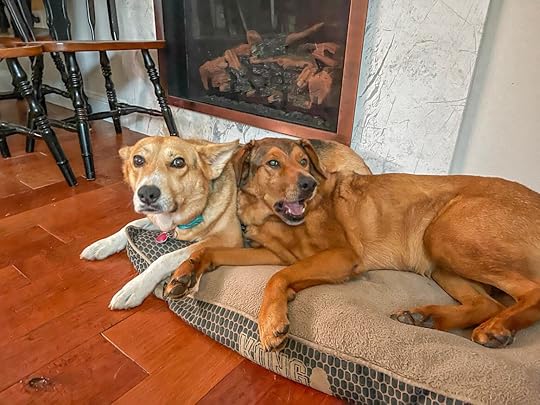





September 30, 2021
Possession is an addiction.Sydney’s spent years burying h...
Possession is an addiction.
Sydney’s spent years burying her past and building a better life for herself and her young son. A respectable marketing job, a house with reclaimed and sustainable furniture, and a boyfriend who loves her son and accepts her, flaws and all.
But when she opens her front door, and a masked intruder knocks her briefly unconscious, everything begins to unravel.
She wakes in the hospital and tells a harrowing story of escape. Of dashing out a broken window. Of running into her neighbors’ yard and calling the police. The cops tell her a different story. Because the intruder is now lying dead in her guest room—murdered in a way that looks intimately personal. Sydney can’t remember killing the man. No one believes her.
Back home, as horrific memories surface, an unnatural darkness begins whispering in her ear. Urging her back to old addictions and a past she’s buried to build a better life for herself and her son. As Sydney searches for truth among the wreckage of a past that won’t stay buried for long, the unquiet darkness begins to grow. To change into something unimaginable. To reveal terrible cravings of its own.
I suck at titles, or collaboration: a love storyYou know how aggressively mediocre movies aren’t good enough to be worth your time and aren’t bad enough to be fun? The working titles I come up with tend to hit that un-sweet spot. The first draft of this novel was called In the Blood. I figured, hey, “blood” is a time-tested horror signifier, so that nails down the genre for the curious reader. And adding “In the…” cleverly reflects the story’s addiction-and-relapse element, and also the theme of the struggle to escape your true nature. Genius!
One of my first readers suggested changing it to The Swimmer, which I immediately adopted because I have enough self-awareness to know that coming up with titles is something I’m better off ceding to others.
The book remained The Swimmer as I queried agents. It was still The Swimmer when it landed at Orbit/Redhook. By that point, the title was cemented in my mind. I began to entertain dreamlike notions of cover concepts. The designs in my head skewed early-aughts literary, with stately fonts and indications of grandeur within, like I was Ian McEwan. I thought The Swimmer struck just the right note of “vaguely ominous,” evoking everything from an out-of-place ripple near your raft in the middle of the lake to a magnificent creature trawling the depths. It also conjured up a fastidious, solitary person—an early morning lap swimmer whose obsessive routine is suddenly upended by a Mysterious or Violent Circumstance. (Note: the book is about none of those things.)
When my editor and the team at Orbit pointed out that The Swimmer is more “extremely vague” than “vaguely ominous”—as in, it could just as easily be a biography of Michael Phelps as a psychological horror tale—I conceded that the title was not going to cut it. I’ve always been a loner when hammering out a draft, but an eager collaborator during edits and all other phases of the process, so I was happy to brainstorm titles with people far more suited to the task. And thus, The Seven Visitations of Sydney Burgess was born. This was yet another valuable lesson in not being too precious, and at the same time being grateful that writing and publishing involves the creative energy of many people working toward a common goal.
The Plural of “Lego” is “Lego”According to the eagle-eyed copyeditor who worked on this book, saying “Legos” is technically incorrect. But! I grew up saying things like “You wanna play Legos?” and “I organized my Legos into color-coordinated bins, isn’t that awesome?” So it felt weird to have the eleven-year-old kid in my book say “Lego” like a fussy aristocrat. The point is, sometimes being wrong, and insisting on remaining wrong, is actually right. You know?
Setting out to write something “scary” is self-defeatingWhen it comes to horror—especially what horrifies you personally—everyone’s mileage varies. That’s what makes horror such an endlessly fertile and creatively limitless genre. I love everything from grimy ‘70s underground films to ‘80s slashers to classic Stephen King doorstops to the creepy horror-adjacent tunes of Scott Walker to the unsettling vibes of Brian Evenson’s short stories and other weird fiction greats. But, at least for me, actually sitting there with the blank page staring back, trying to think up a Scary Moment, is the quickest way to writing something flat and hilariously non-frightening.
There’s an evolution of dread that can only rise organically from a combination of incident, character, and prose all working together to create something ineffable—the kind of skin-crawling moment that can’t really be planned or plotted. When it manifests on the page after some trial and error, it’s a beautiful(ly horrific) thing.
Structure whips plot mechanics into shapeI’m not a very detailed plotter. In the same way that writing with the sole purpose of eliciting fear responses in readers is an exercise in self-conscious futility, outlining the story in advance makes it feel stale to me. I prefer the journey of discovery—but horror thrillers tend to benefit from a destination. What shaped my early drafts into something much more propulsive was the advice of a friend who helped me land on a rigorous structure I could self-impose to keep the story from meandering.
Each section of the novel—or “visitation”—is divided into six chapters, alternating past and present. This not only gave me guardrails to help rein in dangling story tendrils, but also gave the novel a unique feel that complemented its atmosphere. For me it was less of a formal conceit than a way to help organize all the thriller mechanics I was playing with.
A cold open needs a delicate balanceI love a good cold open. Breaking Bad is pretty much the apotheosis, of course—tighty-whities, RV, gas masks, gun, desert…
I’ll go ahead and argue that if Cranston wears boxers in that scene, its attention-grabbing potential plummets. It’s such a wonderful world-building detail that makes you perk up with immediate investment in the character. What kind of man is this, wearing his tighty-whities? There’s pathos here that a nice pair of plaid boxers just can’t evoke.
Anyway, my novel begins mid-home invasion with the line, “The man in my house is wearing a mask.” As I was writing, I was haunted by a comment from a fantasy writer (Brandon Sanderson? It might have been Brandon Sanderson) about the problem with starting a book in the middle of a battle scene—namely, that readers haven’t yet formed personal connections with the characters doing the fighting, so the battle has zero stakes. The challenge with a cold open is to make the world instantly lived-in and the characters feel like three-dimensional, emotionally resonant people without bogging down the action.
To strike that balance, I approached the scene a bit like a painting, laying in stray details that resonated later on—vacation photos on the mantel, everyday stuff in an opened junk drawer, a quick reference to rehab to situate Sydney’s life in context.
From the very first paragraph, Sydney’s not just a character experiencing Plot, but a person moving through her world of tragedy, struggle, redemption, temptation, and horror. She’s in a sort of tactile conversation with the elements of her life and the past that’s waiting in the margins to swamp her in bad old urges.
***
Andy Marino was born in upstate New York, spent half his life in New York City, and now lives in the Hudson Valley. He is the author of seven novels for young readers, most recently The Plot to Kill Hitler trilogy. The Seven Visitations of Sydney Burgess is his first novel for adults.
Andy Marino: Website | Twitter | Instagram
The Seven Visitations Of Sydney Burgess: Indiebound | Bookshop | Powell’s | B&N | Amazon
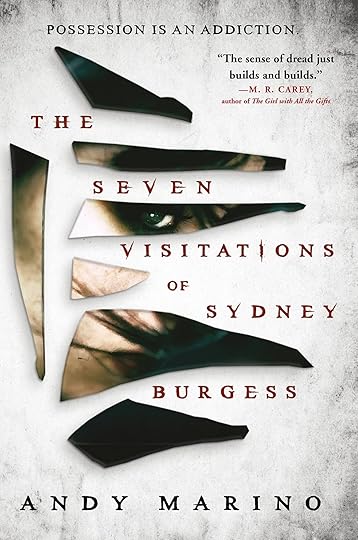
September 22, 2021
Dust & Grim: New Release Date And Events!
 So, maybe you’ve heard tell of these “supply chain issues” that are plaguing everything from lumber to microchips to monkey chow. I mean, I just assume the thing about monkey chow? Whatever. Point is, add one more things to the list of supply chain woes:
So, maybe you’ve heard tell of these “supply chain issues” that are plaguing everything from lumber to microchips to monkey chow. I mean, I just assume the thing about monkey chow? Whatever. Point is, add one more things to the list of supply chain woes:
Books.
What’s causing this supply chain problem with books? I have no idea! Trees for paper? Printing problems in China? Shipping issues domestically? All of the above? No idea.
(I blame goblins. Book-hating goblins.)
So, a lot of books are having their release dates pushed back, sometimes just a couple weeks, sometimes many moons, even pushing 2021 books into 2022, or 2022 books into the Next Glacial Epoch, where they will be read by an advanced race of space-faring trilobites.
Either way, Dust & Grim has fallen victim to these supply woes, but fortunately only had the release date bumped back by two weeks.
Old release date was October 5th, and the new release date is October 19th.
What does this mean? Beyond not getting the book on the date you ordered it?
It means:
a) The events are pushed back, and new event schedule is below.
b) It means if you pre-ordered already, you should check to make sure the pre-order still holds. Some retailers — Amazon has been known for this — will simply cancel all pre-orders if a release date is juggled around. I expect your local indie store will hold firm, but it may be best to call to check.
c) It means if you have not pre-ordered, and you’d like to be guaranteed a print copy, please do pre-order. Even moreso than in Normal Times, pre-ordering now (this book and any upcoming books by authors you like) will help to guarantee you’ll get a physical copy. Shipping and printing woes may still limit copies and waiting till the book is out could ensure the print version is not available. Hopefully not, of course, but pre-ordering helps you get ahead of that particular issue — bonus, it’s good for me, the bookstore, the publisher. It’s bad for the book-hating goblins.
d) If you’re procuring from a library, instead, you can ask them to order the book.
So! That said —
Where should you pre-order?
If you want a signed/personalized copy, my two locals can sort you out:
(They can ship to you.)
I’ll also be doing virtual events (dates below) with Books of Wonder, Scrawl Books, Porter Square, Anderson Bookshop.
You can also find a local indie through Indiebound, or buy through Bookshop.org.
B&N, too, is a good choice for print copies — and you can find other buy links here!
New (virtual) events schedule:
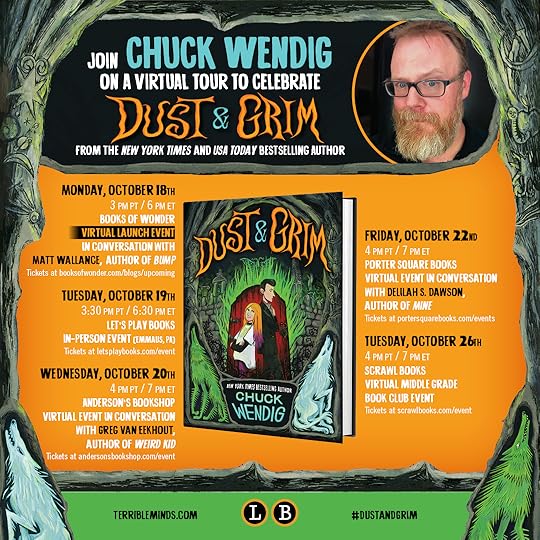
Or, outside of the image, text schedule:
Monday, 10/18, 6PM EST, Virtual launch event at Books of Wonder with Matt Wallace (not, erm, Matt Wallance, you can’t trust that Wallance guy), tickets here. Pre-order Matt’s wonderful Supervillain’s Guide to Being a Fat Kid.
Tuesday, 10/19 6:30PM EST, In-person (!!) event at Let’s Play Books, Emmaus, PA, event details here. All the other events are virtual but this one is theoretically in-person — I’ll have details as to what this entails, I believe it’s going to be outside, not sure about vaccination requirements, I expect masking will be necessary, etc. — and further, expect that the event could go virtual at any moment. Like, whoosh, we’re in the Matrix.
Wednesday, 10/20, 7PM EST, Virtual event at Anderson’s bookshop with Greg Van Eekhout. Event calendar here. And checkout Greg’s newest, Weird Kid, which my own kid adored.
Friday, 10/22, 7PM EST, Virtual event at Porter Square Books with Delilah S. Dawson. Details here. Grab Delilah’s spooky good time, Mine.
Tuesday, 10/26, 7PM EST, Scrawl Books Book Club Event, details here.
Who Did The Art?The artist who did the cover, and the interior art, is the wonderful Jensine Eckwall. All of it beautifully art directed by Karina Granda!
Blurbs “A clever, heartwarming tale of funerary rites, ghosts, and the undying power of family.”—Holly Black, Newbery Honor-winning author of Doll Bones and The Cruel Prince
“A clever, heartwarming tale of funerary rites, ghosts, and the undying power of family.”—Holly Black, Newbery Honor-winning author of Doll Bones and The Cruel Prince
“Wildly inventive, totally hilarious, and unexpectedly moving.”—Lev Grossman, bestselling author of The Silver Arrow and The Magicians
“A one-of-a-kind delight—mysterious, exciting, inventive, sometimes scary and always funny, Dust & Grim reads like a rollicking ghosts and monsters story, which it is. But just as important, it’s a compelling and tender story about family. Sibling duo Molly and Dustin will find their way into readers’ hearts as surely as they find their way into each other’s.”—Trenton Lee Stewart, bestselling author of The Mysterious Benedict Society
“Sucks you in with a wise-cracking zaniness that soon spirals into a delightful rampaging chaos of swarming vampires, thorny wolves, walking trees, and eldritch horrors. And yet even as the dangers for Molly and Dustin increase and the wise-cracks keep flying, the importance of family both lost and found grounds their story with a profound sense of heart.”—Paolo Bacigalupi, bestselling author of The Windup Girl, Ship Breaker, and Zombie Baseball Beatdown
“Spookily charming, bewitchingly creepy, full of hope, heart, and horror, Dust & Grim is the sort of book you gobble up in one sweet and salty bite.”—Delilah S. Dawson, author of Star Wars: PHASMA and Mine
“Every line of Dust & Grim is packed with a laugh, a sharp observation, or something radically cool, and sometimes all three at once. I thoroughly enjoyed it. Wendig is a welcome new voice in middle-grade fiction, and we are lucky to have him.”—Greg van Eekhout, author of Weird Kid, COG, and Voyage of the Dogs
“Siblings Molly and Dustin Grim are the most unlikely of heroes, and for that reason they are among the greatest. The fact that they must save the world from within a secret monster mortuary is only the first of many surprises that bestselling tale-spinner Chuck Wendig has created for this full-of-heart debut about trust, friendship, and the importance of having the perfect costume for every occasion. A fantastic, spooky adventure!”—Fran Wilde, Nebula Award winning author of Updraft and Riverland
“Playing to strengths demonstrated in his many comics and tales for older audiences, not only is Wendig a dab hand at concocting extremely creepy critters, but here he also pulls together a secondary cast of quarrelsome but supportive allies for the beleaguered teens.”—Kirkus Reviews
“Monstrously fun…. A sure pick for those enamored by Neil Gaiman’s The Graveyard Book (2008), and Tahereh Mafi’s Whichwood (2017).”—Booklist
September 16, 2021
What’s Up In Wendigworld
 Right out of the gate let’s ask — are these kinds of updates interesting to you? Meaning, just the general here’s some stuff I’m doing, here’s some things I’m enjoying, hey look, birds, bugs, and dogs. If they are, I’ll do more. If they’re not, I’ll do less, and also I’ll collect my many tears in little phials and sell them to various wizards, sorcerers, and magical ne’er-do-wells as a vital reagent for their mystical crimes.
Right out of the gate let’s ask — are these kinds of updates interesting to you? Meaning, just the general here’s some stuff I’m doing, here’s some things I’m enjoying, hey look, birds, bugs, and dogs. If they are, I’ll do more. If they’re not, I’ll do less, and also I’ll collect my many tears in little phials and sell them to various wizards, sorcerers, and magical ne’er-do-wells as a vital reagent for their mystical crimes.
Anyway, let the updates begin.
Dust & Grim, Delayed
I’ll have more info shortly about tour dates, but Dust & Grim is delayed two weeks due to *star shooting across sky leaving a rainbow behind* SUPPLY CHAIN ISSUES. What does this mean? Well! This means it will be coming out on October 19th, so please check your pre-orders and such accordingly. Pre-orders are especially useful right now to help guarantee you get a printed copy if you want one. You can nab signed/personalized copies from either Doylestown Bookshop or Let’s Play Books. You’ll know more when I know more!
Our Dog’s Butt Is Haunted
Our Frankencorgi Shepherd, Snoobug, has a haunted butt.
It has been haunted for a while by some kind of sinister butt ghost(s), and it has required occasional medical intervention on behalf of this haunted butt (scientific term: “infected anal glands,” I’m sorry, I know that’s not a term anyone wants to hear or think about, I hope you didn’t just eat breakfast), usually in the form of antibiotics. Which is where we are at, again. One problem: the antibiotics make her go fucking batshit for a little while — last time was only for a day or two. Day two of the course this time, oh my god, she became an entirely different dog. She’d fart, and then jump up like a ghost bit her ass, and then she’d instantly become Velcro Dog. She’s always sweet, to be clear, but she’s usually content to come in for a petting or two, then bail. And further, she’s always a little wonky, and there are places in our house she just won’t go — she’s never been in the downstairs bathroom, never in the laundry room, never ever jumped up on the couch.
Yesterday, she did all three. Without thinking, without reserve. We found her in the laundry room at one point. She followed my wife into the bathroom while she showered. I was on the couch, playing Deathloop (which is a lot of fun, if you care), and suddenly, BUTT GHOST, and she was crawling up into my lap. And she has never, ever done that in seven years.
This morning she seems a little calmer, so here’s hoping the meds are successfully exorcising the Anus Wraiths (who I saw open for Ministry in 93, by the way). Because failing that, the vet is recommending a very expensive operation, whiiiiiiich is not great. She already had to have some kind of “cold laser” procedure on her butt. The vet probably just made that up, didn’t they? Whatever. Point is, buy my books, because hahaha ow. Buy a book, help a dog. How nice.
I Make Pizza Now, I Am Pizza Chuck, Itsa Me, Chucky-o
Okay, I’m not really good at making pizza yet. But I’m getting better. I have an Ooni pizza oven, and I say this not as any kind of paid endorsement, but it’s fucking legit. It is as promised — you pop that thing on and fifteen minutes later, it’s 900 degrees. Like Walter White, it’s ready to cook. Pizza goes in on peel, ~2 minutes later, done pizza.
My preference is that Neapolitan-style crust, thin and chewy — my recent effort was the Babish recipe, and I usually like his recipes, but I either did something wrong or, ennh, I dunno. Gonna go with Kenji next, as his recipes are usually very reliable — his scrambled eggs situation was sublime. (Cornstarch, salt, and butter. Perfect scrambled eggs every time. Also, sans butter, works with omelettes, makes them amazing.)
It’s Heirloom Apple Season, Motherfucker
And I will be getting heirloom apples this year however I jolly well can. And instead of reviewing them on Twitter, which is a Hell Realm, I’ll talk about them here, because this place needs some appley goodness.
It’s Also Fall Migration, Motherfucker
It’s that time when all the Cool Birds leave their soon-to-be-wintry climes and fuck off south, which means it becomes Warblertown up around here (WHO RULE WARBLER TOWN, WARBLER ADORBLER RULE WARBLERTOWN), and of course it’s fall warblers, so they all look the same, the little bastards. But they’re great. Birds don’t give a shit about our stupid problems and they’re cool and we should try to make the world a better place, if for nothing else than birds and apples.
Remember, too, fall migration is time to turn out your lights at night.
Save the birds, save the world.
Hey, Get Vaccinated, You Jabronis
I don’t mean to get all “””political””” on this here Bird-and-Apple Blog, but PA just released their numbers, and 94% of their COVID cases are unvaccinated people. Now, I understand those numbers don’t likely include breakthrough infections that are mild or asymptomatic, because we do not test robustly, and people who only have mild symptoms may get no tests at all (especially during allergy season), but just the same, that still underscores the fact that those getting tested likely have serious enough illness to warrant the tests. What this means of course is that
WOW, WHOA, VACCINES WORK
WHO KNEW
IT’S NOT LIKE VACCINES ARE THE ABSOLUTE BACKBONE OF OUR CIVILIZATION OR ANYTHING OH WAIT, THEY TOTALLY ARE??
HEY, DID YOU GET POLIO LAST YEAR
HOW ABOUT SMALLPOX
NO?
WEIRD I WONDER WHY
I WONDER IF IT’S THESE *checks notes* AWESOME VACCINES WE HAVE
JESUS CHRIST GET VACCINATED
Ahem. I’m sure most of you very awesome people are already vaxxed! But if you’re not, hey, fix that immediately. It is likely to save your life. And here you might be saying, “Buh, buh, but why do care if I exercise my HEALTH FREEDOMS not to stick myself with the BILL GATES DEMON JUICE,” and here I’ll note it’s because if you get sick from COVID and end up in the hospital, you’re taking a bed that could go to someone whose disease is not their own fault. And if you’re not vaccinated, guess what? That’s your own damn fault. So let’s not choke the hospital system and bring it to its knees. Let’s free up beds for cancer patients and sick kids, not Johnny Covidtown who should’ve fucking known better and just gotten the FREE and HARMLESS vaccine that would’ve saved his life instead of ending it pain-throttled and alone on a ventilator shoved down his throat. Cool? Cool.
Pennsylvania: Tornado Alley!
Over the last couple months we’ve had two incidents of tornadoes ripping through our area — the first time, we had one tornado hit a half-mile north of us, and a second one hit a half-mile south. This past time, about three-four miles south of us, and in fact, it tore its way through my sister’s backyard, knocking down a line of trees. What a mess. Seven tornadoes on the first go, nine this time. BUT HA HA CLIMATE CHANGE ISN’T A THING, right? You know Pennsylvania, it’s known for its tornadoes. Probably. Maybe. Shut up.
Most Ted Lasso Hot Takes Are Bad, Actually
If not bad, then just plain silly. This is not an exhortation for you to like the show or for you to find it without problem, I just thought it odd that at the start of this second season, we were deluged with a barrage (or barraged with a deluge) of Bad Ted Lasso takes, ranging from the Wow This Season Isn’t Going Anywhere to The Show Is Bad And You Should Feel Bad For Liking It, all of which are wrong and bad and shhhh. Just stop. Let people like things. And also let a show do its thing before you judge it. Now that we’re deeper into the season, it’s really going some important places, and I want to go along on that ride. You don’t have to, but I think it’s pretty great. I want to let it have its say before I judge it. Also, Roy Kent forever, please and thank you. And Sam! And Rebecca! Yes. Anyway. Moving on. It’s also still okay if you don’t like it. Just don’t tell me about it.
Some Things Wot I Enjoyed Recently
The Murderbot Books, getting caught up on them — Martha Wells
McCammon’s Matthew Corbett books
Evil, on Paramount-Plus
Kid Cosmic, Netflix
Just finishing up Delilah Dawson’s The Violence, and whooooa dang
Premee Mohamed’s Annual Migration of Clouds
Cassandra Khaw’s The All-Consuming World
Infinity Train, HBO Max
Birds and Bugs, As Promised
Here are some birds and bugs I’ve seen recently (with more at Flickr):



Buy My Books Or I Die
The Book of Accidents is available, and primed for your SPOOKY SEASON needs. It’s creepy and it’s kooky, it’s altogether spooky. Coal mines, haunted houses, serial killers, maybe a demon, some interstitial realms. It’s a blast. Go get. Or I die writhing in the abyss. And leave a review, somewhere, pretty please? With a pick-axe on top?

August 17, 2021
Emily Wenstrom: Why We Need ADHD Representation in Fiction
A guest post from Emily Wenstrom about ADHD representation in fiction — please read, and then check out her new novel, Departures.
***
When I first got my ADHD diagnosis in high school, I had no choice but to be loud about it. This all came about in the first place because years of good academics and a reputation as the quiet, low-maintenance girl in the back of the room let my symptoms go by unnoticed for years, until my grades took an abrupt nosedive as the different structure and higher challenges of high school caught up with me.
Even with my Section 504 in hand, multiple teachers actively resisted granting me rights as simple as an extra copy of the text book.
I didn’t have ADHD, I played too many sports. I didn’t have ADHD, I didn’t belong in advanced math. I didn’t have ADHD, I just needed to be more responsible.
I could rant for a while on this, but the point is, there was pushback to the point of animosity, based on stereotypes about what ADHD is and what it should look like. I guess I didn’t look like that, to these teachers.
But a universal truth about high school is that it ends, thank goodness. I educated myself about my symptoms and associated weaknesses, and eventually found ways to address them enough to go unnoticed.
And for a very long time after that, I took advantage of my option to be very quiet about my ADHD (to be clear, this ability to choose to go unnoticed is privilege in action–not all ADHD-ers or other neurodiverse folks have this option). I didn’t want the baggage that came with the label. Especially in my career, I didn’t want to give anyone the ammunition to read into a typo or request for a deadline extension – I would be perfect all the time (at least to the external observer), and they would never have to know. The cost of the baggage associated with ADHD just felt too high.
Because just like my high school teachers, what so many people fail to understand about ADHD, is that this different type of brain wiring can come with strengths just as much as it does weaknesses.
I can hop on my soapbox and shout this until I’m blue in the face … but I think better representation in fiction could be a lot more powerful.
Representation in Fiction Meets a Basic Human Need
From POC to LGBTQIA to physical disabilities and neurodivergence of all kinds, combinations thereof, and beyond, representation matters.
As Psych Today explains, feeling seen is a basic human need we all share. This includes consideration of our needs and requests, equitable access and treatment, and representation, too. Seeing ourselves represented in stories is one wonderful and important way to accomplish this. Conversely, the failure of inclusion is also powerful—and damaging.
As a child, I gravitated toward characters who shared my symptoms long before I even knew what they were symptoms of. I sought out catharsis else where in characters who I felt shared my symptoms, like Anne Shirley and Meg Murry.
Seeing these dynamic, multidimensional, heroic characters who shared my struggles (and, most importantly, overcame them) filled me with hope and shifted my self-perception. If these characters could overcome these struggles, maybe I could too. If these characters shared my flaws but were still worthy of love and support and being rooted for, maybe I was too.
ADHD Representation in Fiction
There is a notable lack of ADHD representation in fiction. There are a number of books for children with ADHD written specifically to this audience to help them understand their diagnosis and cope with symptoms. These have value, but when it comes to mainstream stories about more than ADHD 101, it’s a struggle to find more than a few examples.
Go ahead and try to look up a list of ADHD characters—most will in fact offer characters who were retroactively diagnosed by the list writer, rather than the author, because that’s the best we can do. Did you know Emma Woodhouse had ADHD? Sherlock Holmes?
In fact, I was so accustomed to not seeing neurodiverse representation in stories, it took exposure to better role models to realize what was missing. Authors like Corinne Duyvis who has long pushed for better representation of neurodiversity and disability, and Rick Riordan, who originally wrote the Percy Jackson series to create a hero his own son, who has ADHD and dyslexia, would relate to.
It’s easy with ADHD and other learning disorders to feel reduced to a list of symptoms. This is where characters in stories really shine: they are multidimensional. They have both good traits and flaws—even the heroes. A story with an ADHD character shows strengths in addition to weaknesses and creates something much more human and whole.
Really, Riordan said it best:
“I thought about Haley’s struggle with ADHD and dyslexia. I imagined the faces of all the students I’d taught who had these same conditions. I felt the need to honor them, to let them know that being different wasn’t a bad thing. Intelligence wasn’t always measurable with a piece of paper and a number two pencil. Talent didn’t come in only one flavor.”
Representation is for All of Us
The benefits of representation aren’t just for those who finally get to see themselves included. For those outside the group gaining inclusion, representation also helps us build empathy, connection and a better understanding of those different from us. We gain perspective, experience and a more complex and accurate view of the world.
When it comes to ADHD, there’s a lot of baggage. People expect constant hyperactivity, assume only little boys to have it, or even think it’s fake. But ADHD is a lot more complex than this. It can manifest as “checking out” from what’s going on around you, hyperfocus, Rejection Sensitivity Dysphoria, difficulty regulating emotions, and a myriad of other forms or combinations, depending on the person and the situation. The more we can show that it looks different in different people—different characters—the more we can bust apart stereotypes and see value and complexity in neurodiversity, rather than limitation.
There are many types of representation needed more in fiction, and this is just one type – certainly not trying to imply it’s any more important any others, and indeed some other representation needs feel especially urgent these days.
Regardless, representation enriches all of us.
I’ve slowly started being louder about my ADHD again (if you couldn’t tell), across all areas of my life, including what I write. My most recent novel even put an ADHD character front and center, and made it central to the plot, my own small effort toward adding to what’s needed, with hopefully more to come. And I have to tell you, it feels good not to be the quiet girl hiding in the back anymore.
***
About Departures:
She’s planned her celebration for weeks, and other than leaving her sister Gracelyn behind, she’s ready. The Directorate says this is how it should be, and she trusts them, as all its citizens do. So tonight she dresses up, she has a party, and she dances. Then she goes to sleep for the last time … except, the next morning, Evalee wakes up.
Gracelyn is a model Directorate citizen with a prodigious future ahead. If she could only stop thinking about the shuffling from Evalee’s room on her departure morning. Even wondering if something went wrong is treasonous enough to ruin her. If she pulls at the thread, the entire careful life the Directorate set for her could unravel into chaos.
Swept away by rebels, Evalee must navigate a future she didn’t count on in a new, untidy world. As the Directorate’s lies are stripped away, she becomes determined to break Gracelyn free from its grasp—before Gracelyn ’s search for the truth proves her to be more unruly than she’s worth to the Directorate.
Buy Departures Now: Amazon







